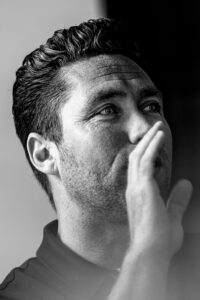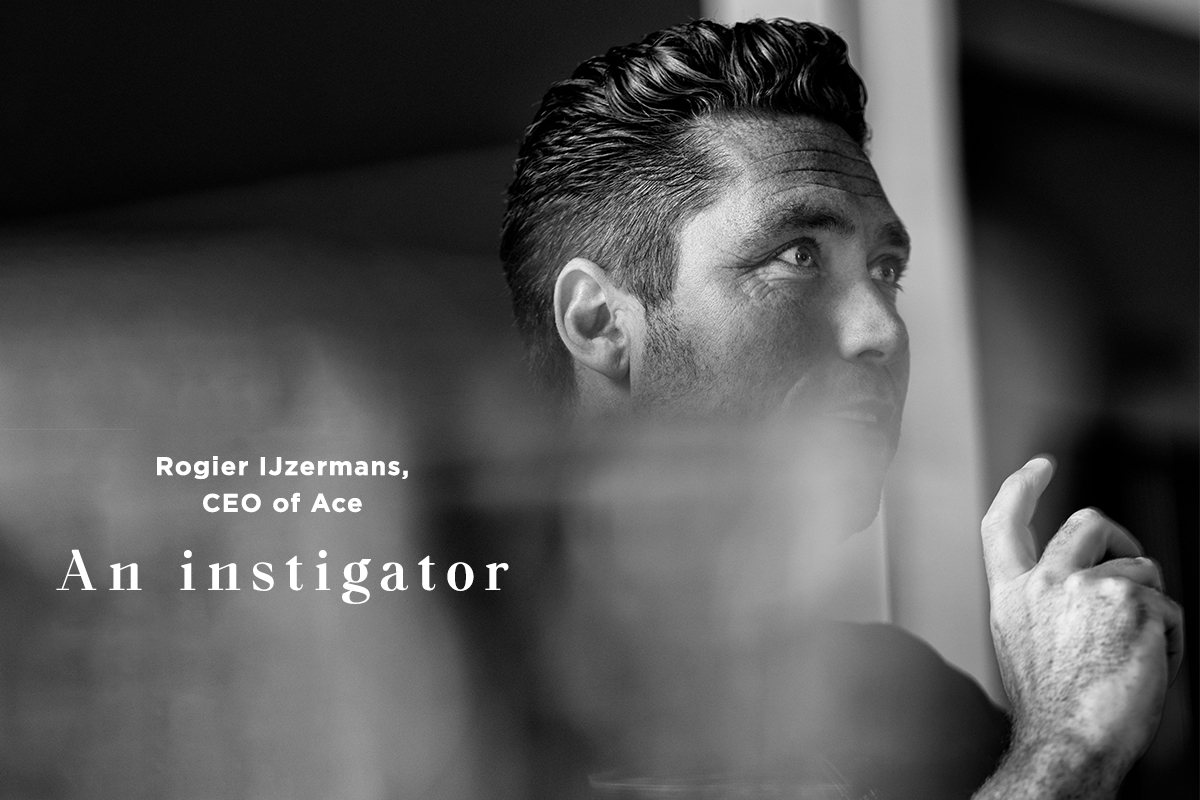The Maliebaan avenue in Utrecht is known for its grand buildings. Cars worth less than 100k park in another street. Carefully polished boards display the logos of chic law firms. And the flags of financial service providers flutter in the wind. On one corner there’s a beautiful white building, at least 400 years old. On the façade the name Born05 can be seen, spelled out in white letters and numbers.
About ten years ago, a designer transformed the entrance hall into something more contemporary. At that time grand gestures were the norm. For example, it features a reception desk of perhaps 10 metres in length, covered with mirrors; there’s an enormous vase and an even larger lamp. Nowadays, that would all be done differently, I tell photographer Kees Rijken. That’s the moment when Rogier IJzermans comes in. I feel a little caught out, but he has to laugh. “It’s really nice you noticed that; I’ll be happy to come back to that later.”
Culture
Two things struck me in my preparation for this conversation. Firstly, that people who know Rogier are full of admiration for his character and personality. Not one person criticised him on that score. That’s great for Rogier, but not necessarily for you as a reader; a slightly abrasive text always makes for a better read. And secondly, in all the interviews he gives he always talks about the importance of the ‘culture’ of organisations, including Ace’s, without clearly defining what that is. My mission now is to get that clear and down on paper.
I came up with the idea for my first business during the exam for my scooter driving licence.
 A born entrepreneur
A born entrepreneur
IJzermans starts with a detour: “I’ll take you on my journey, okay? From day one I was immensely interested in the connection between the physical and digital world. I wanted to design products and services that add value to people’s daily lives. So, I aimed to go to art school. I found most of them too insular, simply not of the ‘here and now’. At the time, the HKU (University of Arts Utrecht) was the only university that had a course that focused on digital. It was called Art, Media & Technology, and that’s what I chose.” I interrupt him, I know from my own experience that you will be accepted at an art academy if you can show a folder of work that proves your talent, I want to know what was in his folder. “I had a business in my folder (he ignores my surprise). When I was 16 I had to take the theory test for my scooter driving licence. Out of a book! That same day I bought a URL, theorieles.nl (theorylesson.nl) and started putting exams online and charging for them. It proved to be a success in no time, and it was a nice earner for me. I worked with a driving school owner to create the content and built the rest myself. I sold that business when I went to the HKU.’
I started this company with the two best students from my art school.
Products with RFID tags
He obtained his master’s degree with an innovative supermarket concept, in which the barcodes for products were modified to work with RFID tags, allowing them to communicate remotely with each other and with customers. IJzermans responds to my wide-eyed reaction by providing this dummy with a short course on the power of radio frequencies for communication and interactivity (I suggest you go google that for yourself). This young ‘bouncing ball’, who had just graduated, sold the concept to a large supermarket chain shortly after finishing his studies. That was because IJzermans wanted to start a company together with two classmates – and friends – from the academy. They called it Born05 and set up shop at a former hairdressing salon in Utrecht’s C district.
The start
“In 2005 we developed a digital magazine together with Wegener, and we were able to use data to personalise the content. Then Daniel Ropers and Michel Schaeffer from Bol.com knocked on our door. They could see the potential power of our digital product even better than us. It made it possible for Bol.com to present the breadth of their product portfolio digitally. In addition, we built consumer-orientation profiles that were linked to existing transaction profiles. This put Bol.com way ahead of the field. Thanks to our start-up clients such as Bol.com and later KLM, we grew really fast, and our products went international straightaway. We still work for both those clients today, isn’t that great?’
From concept to revenue model
I remember being very jealous of KLM’s iFly Magazine. What made it worse was that I didn’t even know how they did that, creating such a great, dynamic experience on my old computer. To my surprise, it wasn’t actually down to the wonderful content at all. KLM’s fundamental issue was quite different: “Can we develop other revenue models for the people who buy tickets from us? So, in addition to ticket sales, they were after a retail and media proposition that would increase the value of KLM’s relationship with its passengers. We were more interested in engagement than views. The relationship with the end user, that’s what it’s all about. And that’s why we’re still in the game. At Ace, for example, our new client Radio 538 doesn’t simply ask us to come up with a good campaign, no, they brief us with just a single sentence: we want to be the market leader again. And that’s something we, with all the agencies at Ace, can help to achieve.”
Suddenly everyone was talking to each other about each other.
Growing to bursting point
Because it is not ‘authentic’ to simply string together a list of success stories, IJzermans also wants to tell me about a less fantastic period. “We grew so fast that we eventually developed a middle management layer. I well remember walking into the office and seeing everyone talking to each other, about each other. That was never the intention. Why weren’t they working on the ‘business’? But you tend to think that it just comes with growth. Not so. I felt the ‘club’ was slipping through my fingers. Before I knew it, we found ourselves having to make up a significant amount of ground because this new layer of management didn’t have a feeling for the culture that was the entire basis for the way we ran the club. So, we bid farewell to that kind of ‘manager’, we no longer have them, and we adopted a totally different approach.”
From cells to group
“About 35 people is the ideal match for our culture, so in 2013 we split the company up into cells of that size, following Eckart Wintzen’s concept. And those cells were given complete autonomy. They each had their own P&L but remained accessible to each other. Where possible they worked together and complemented each other. They all had the same philosophy and culture. The concept of those cells worked a lot better than that dreadful idea of middle management. The idea of our current agency group structure is also based on that principle: all autonomous and specialised agencies that come together with one purpose and share the same culture.’
There you have it again, IJzermans’ favourite word: culture. I’m still not quite sure what he means by that. So, I don’t give up and keep asking.
A boys’ storybook
You could easily fill an entire boys’ storybook with the success story that IJzermans is relating to me. Trying to summarise all that would mean doing him an injustice, but I have no choice here. Someone should really write that book sometime. Ace has expanded with the addition of eight agencies in the past 18 months, and three more acquisitions are planned for this year. “That’ll complete the flower.” The Flower? “Yes, I think that’s a nice metaphor. Each petal represents a single agency and is unique in itself, but they all come together at the heart of the flower and even overlap one another. That symbolises the dream of a truly integrated group of agencies. When that flower is fully grown, we will go international.”
He tries to give shape to this image with his hands. I see a vase full of flowers before me. His body language is a joy to read. Sometimes he gets up and walks around the room, then he suddenly looks at you intensely to check whether you are still paying attention, or he shifts in his chair to add emphasis to something he says. His drive is impressive. “I was going to come back to your observation about these premises, wasn’t I?” I nod appreciatively. “We are working on a new office concept: Club Ace. An open and inclusive club for all the staff and clients of the various agencies, where they can work, create, exercise, eat, have a drink and connect. Friends of Ace would also be welcome; I would love that! But it will also be a place that gives something back to the local community, through open evenings, exhibitions of local talent, etc. Because the function of offices has changed forever with the pandemic; let’s do something with that corona effect!”
Igor Milder
“My example? Igor Milder. Well known from Lost Boys, Open Industries and Talpa. The first and, in retrospect, the only person I ever listened to. Igor had a cocktail of qualities that captivated everyone. Me too. Enterprising, creative, strategic, humane, empathetic, business-like, hard, soft. A unique person. Sadly, he’s no longer with us, but he lives on every day in the way I run my businesses and live my life.”
Your vibe attracts your tribe.
Culture bearer
His enthusiasm is hypnotic, it’s got me sitting on the edge of my seat. Not for one moment am I tempted to take my eyes off him. I don’t even hear any distracting sounds and I’ve let my coffee go cold. In the end I feel obliged to respond with energy. Kees Rijken, the photographer, has heard everything while snapping away. He knows I’m out to define what that ‘culture’ is. He whispers in my ear, “Rogier is the culture.” I don’t get what he means right away, but in the car, on the way home, I realise that Kees is right.
Instigator
Ace’s culture is enthusiasm. Don’t highlight the mistakes, focus on the things that are going well. Enjoy it, make it bigger. If you can do that together, there’s no room for hierarchy and everyone is equally important, as long as you contribute to the bigger picture and the greater aim. The function of Rogier IJzermans is to embody all of this and radiate the same message consistently. He’s not really a captain, he’s an instigator.
Crypto coin
The final part of our conversation concerns his hopes that he and Ace will issue an own crypto currency. That’s the kind of plan which, I think, you only dare to have if your ideas and thoughts know no bounds. I think he’ll actually do it, too, and predict that one day he’ll be billing clients for their projects in Ace coins, not euros.
SHARE THIS POST
